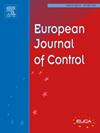Minimizing the homogeneous L2-gain of homogeneous differentiators
IF 2.5
3区 计算机科学
Q2 AUTOMATION & CONTROL SYSTEMS
引用次数: 0
Abstract
The differentiation of noisy signals using the family of homogeneous differentiators is considered. It includes the high-gain (linear) as well as robust exact (discontinuous) differentiator. To characterize the effect of noise and disturbance on the differentiation estimation error, the generalized, homogeneous -gain is utilized. Analog to the classical -gain, it is not defined for the discontinuous case w.r.t. disturbances acting on the last channel. Thus, only continuous differentiators are addressed. The gain is estimated using a differential dissipation inequality, where a scaled Lyapunov function acts as storage function for the homogeneous supply rate. The fixed differentiator gains are scaled with a gain-scaling parameter similar to the high-gain differentiator. This paper shows the existence of an optimal scaling which minimizes the homogeneous -gain estimate and provides a procedure to obtain it locally. Differentiators of dimension two are considered and the results are illustrated via numerical evaluation and a simulation example.
使同质微分器的同质 L2 增益最小化
研究考虑了使用同质微分器系列对噪声信号进行微分的问题。它包括高增益(线性)微分器和稳健精确(非连续)微分器。为了描述噪声和干扰对微分估计误差的影响,使用了广义同质 L2 增益。与经典的 Lp 增益类似,它并不针对作用于最后一个信道的干扰的不连续情况。因此,只涉及连续微分器。增益是通过微分耗散不等式估算的,其中按比例缩放的 Lyapunov 函数充当了同质 L2 供给率的存储函数。固定微分器增益的缩放参数与高增益微分器类似。本文证明了最优缩放的存在,它能使同质 L2 增益估计值最小化,并提供了局部获取最优缩放的程序。本文考虑了维数为 2 的微分器,并通过数值评估和仿真实例对结果进行了说明。
本文章由计算机程序翻译,如有差异,请以英文原文为准。
求助全文
约1分钟内获得全文
求助全文
来源期刊

European Journal of Control
工程技术-自动化与控制系统
CiteScore
5.80
自引率
5.90%
发文量
131
审稿时长
1 months
期刊介绍:
The European Control Association (EUCA) has among its objectives to promote the development of the discipline. Apart from the European Control Conferences, the European Journal of Control is the Association''s main channel for the dissemination of important contributions in the field.
The aim of the Journal is to publish high quality papers on the theory and practice of control and systems engineering.
The scope of the Journal will be wide and cover all aspects of the discipline including methodologies, techniques and applications.
Research in control and systems engineering is necessary to develop new concepts and tools which enhance our understanding and improve our ability to design and implement high performance control systems. Submitted papers should stress the practical motivations and relevance of their results.
The design and implementation of a successful control system requires the use of a range of techniques:
Modelling
Robustness Analysis
Identification
Optimization
Control Law Design
Numerical analysis
Fault Detection, and so on.
 求助内容:
求助内容: 应助结果提醒方式:
应助结果提醒方式:


